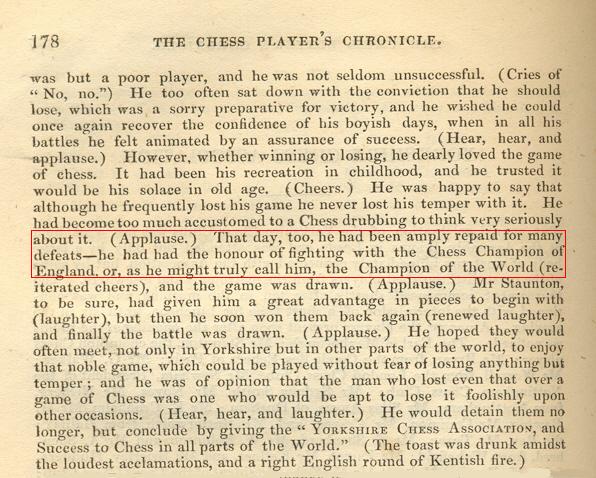
Edward Winter
We present a compilation of early uses of such terms as ‘world champion’ and ‘world championship’ in relation to chess, a topic raised by W.G. Povarov (Moscow) in C.N. 2059 (see pages 324-325 of Kings, Commoners and Knaves). Some further details are available in the references indexed under ‘World champion (early uses of the term)’ in our Factfinder. As regards Steinitz, fuller versions of some of the quotes appear on pages 135-137 of Chess Facts and Fables. Additions to the compilation will be welcome.
1845:
Pages 177-182 of the 1845 Chess Player’s Chronicle (with the cover date 1846) carried a report on the annual celebration of the Yorkshire Chess Clubs in Leeds, chaired by the Earl of Mexborough and with Howard Staunton in attendance. The report of the Earl’s speech included the following description of Staunton: ‘... the Chess Champion of England, or, as he might truly call him, the Champion of the World’.

The above quote was provided by Robert John McCrary (Columbia, SC, USA), who also drew our attention to the next two.
1850:
The following come from the 1850 volume of the Chess Player’s Chronicle (pages 318-319 and 347-349 respectively):
‘I remember lately reading a suggestion somewhere that a “Grand Match” might be fitly got up on the occasion of the great Scientific Meeting projected for 1851 – a match in which the stakes should be of sufficient magnitude to induce the presence of the continental chess magnates, and which might be fairly deemed a contest for the “Championship of the World”.’
‘There can be little doubt, I fancy, that all the finest chessplayers of the day, who can possibly find opportunity to attend, will be attracted by this tourney. The first-rates will gird up their loins, and march with stalwart tread into the lists, to combat à l’outrance for the baton of the World’s Chess Champion, which would be the victor’s meed ...’
1851:
Two claims on Staunton’s behalf were published in his magazine, the Chess Player’s Chronicle, in 1851, shortly before that year’s London tournament (at which he was to fare poorly). The first, on page 88, was from the Brighton Gazette:
‘At this grand tournament it will be a spectacle of surpassing interest to witness Mr Staunton the English Champion, and in general estimation the first player in the world, in actual conflict with two or three players of the finest talent, but with whom he has not hitherto broken a lance.’
The next two pages had a letter from a correspondent, Edward Cronhelm, which included a reference to ‘H. Staunton, Esq., the present holder of the chess sceptre’.
See page 353 of A Chess Omnibus.
Jerry Spinrad (Nashville, TN, USA) sends a copy of an item entitled ‘A Great Game of Chess’ in Liberator, 27 June 1851. It consists of two quotes, and the first, from the Cincinnati Nonpareil, stated that Löwenthal was about to participate in the London, 1851 tournament. It concluded:
‘The man who comes off victorious in the game receives the purse and is crowned the King Player of the world. Mr Löwenthal has gone to try for the crown and – the purse.’
We are always glad to receive such early references, whether or not a specific term like ‘world championship’ is used.
(3684)
1852:
As reported in C.N. 5465, in 1852 the Chess Player’s Chronicle (pages 248-251) contained a report on Staunton’s visit to Edinburgh in early July that year. Two excerpts:
Thomas Niessen (Aachen, Germany) adds that a similar remark had appeared in an article entitled ‘Chess Soirée at Manchester’ on pages 219-220 of the same volume. The speeches included the observation that ‘Mr Staunton was still, as he had long been, the first player in the world’.
1857:
‘But one remains – the noblest heart –
At him thy glove be hurled;
Der Lasa conquered then thou art
The Champion of the World.’
This was the final stanza of a poem to Paul Morphy by Edwin J. Weller, Boston, 9 November 1857 in Chess Monthly, December 1857, page 367.
1858:
From page 613 of Harper’s Weekly, 25 September 1858:
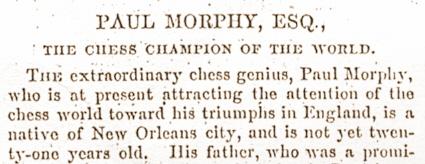
(Regarding the Morphy v Harrwitz match): ‘… no man living can tell whether, or no, these two gentlemen are not now engaged in fighting for the Chess championship of the whole world!’ C.H. Stanley, Harper’s Weekly, 9 October 1858.
‘Morphy is comparatively a boy, but he stands today the champion
of the world.’ The American Union, 9 October 1858. (C.N.
3030; see too pages 324-325 of Kings, Commoners and Knaves.)
The paragraph below was published on page 325 of Kings, Commoners and Knaves:
‘The Chess Championship of Europe – Morphy vs Staunton’. Porter’s Spirit of the Times, 13 November 1858. The article also referred to Staunton’s ‘assumed position as Chess Champion of Europe’. In the same column N. Marache wrote that Staunton ‘has, for years, written and printed himself the “Champion of the World”, (?) without ever having taken the slightest steps to sustain his usurped title’. The following week’s issue (20 November 1858) also called Staunton ‘the self-styled Chess Champion of the world’ and wrote about Morphy v Staunton under the heading ‘The chess championship of Europe’.
1859:
As pointed out by Thomas Niessen, page 194 of the Chess Player’s Chronicle, 1859 has a reference to Staunton in connection with his 1843 match victory over Saint Amant:
‘Having conquered the French champion, and there being no other champion in the field at the time, the English champion was considered the champion of the world.’
An extract from a report entitled ‘Morphy in London’ on page 195 (misnumbered 189) of the June 1859 Chess Monthly:
‘On Thursday (14 April) the long-established London Club gave him [Morphy] a dinner at the Ship Hotel, Greenwich. Mr Mongredien occupied the chair, and in an able and glowing speech called the attention of the room to the presence of the King of Chess, lauded his ability, courteous demeanor and modesty only equalled by his skill. In welcoming him back to England he expressed his regret that his stay was to be so brief, and terminated his remarks by proposing the health of the Champion of the World.’
Thomas Niessen notes that the New York Musical World of 14 May 1859 (chess column by Sam Loyd) reproduced an article from the London Era of 17 April 1859 which stated that Morphy was ‘now recognized as the Champion of the chess world’.
In C.N. 9351 Hassan Roger Sadeghi (Lausanne, Switzerland) noted the reference to Morphy at the start of an article on page 9 of Scientific American, 2 July 1859:
‘... they have exhibited a strong exultant feeling in welcoming him back to his native land as the Chess Champion of the World.’
1861:
In C.N. 9358 Rod Edwards (Victoria, BC, Canada) gave a paragraph from J. Löwenthal’s column on page 5 of the Era, 1 December 1861:
‘Mr Paul Morphy. Now that so many distinguished players have had an opportunity of displaying their powers in this country, and under the eye of our most eminent amateurs, an opportunity has been afforded of comparing Mr Morphy’s play with that of others of the highest pretensions, and the conclusion which is come to on all hands, even by these eminent players themselves, is that Mr Paul Morphy stands on a pedestal far above any other living player. We ourselves have long maintained this opinion; but we will not conceal that we have been most anxious to see Europe vindicate its old prestige. However, at present, it must be admitted that America boasts the Chess Champion of the World. Mr Morphy’s games have exhibited in the very highest degree a pre-eminence of skill in every branch. His extraordinary quickness of perception, his power of combination, the accuracy of his strategy, and the genius and originality which characterizes the whole conduct of his play, combine to render him a perfect prodigy of power as a chessplayer. It is hoped that efforts will be made to secure Mr Morphy’s presence in London during the Grand Congress next year. We feel sure that every chess amateur in the country will hail his coming with satisfaction.’
1866:
Steinitz defeated Anderssen +8 –6 =0 in London. No use of any term such as ‘world championship match’ has been located.
1872:
From the Hartford Weekly Times, 22 June 1872:
‘... the ex-Chess champion of the world – Paul Morphy.’
The newspaper’s chess column also had the following on 6 July 1872:
‘At ten years of age Morphy beat his father at chess and before he was 20 he occupied the proud position of Chess champion of the world.’
Steinitz defeated Zukertort +7 –1 =4 in London. From page 150 of the Chess Player’s Chronicle, October 1872:
‘The one-sided character of the play must be attributed (as the Westminster Papers have pointed out) to the ill-health of Mr Zukertort; but this does not detract from the well-earned laurels of Mr Steinitz, who may now be fairly pronounced the champion player of the time.’
1874:
A reference on page 61 of the New York Clipper, 23 May 1874 (answers to correspondents) has been provided by Thomas Niessen:
‘“Edwin”, Troy, MO. Paul Morphy is still living but has withdrawn from chess. Herr Steinitz is now the recognized “Champion of the World”.’
From page 3 of the Newcastle Daily Chronicle, 27 July 1874:
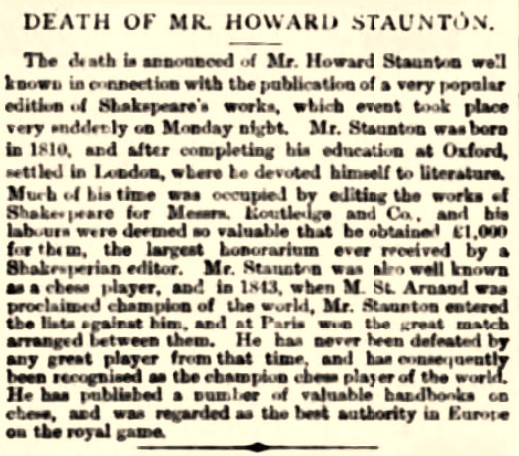
Chess is not mentioned until the latter part of the report, but the statement that Staunton ‘has consequently been recognised as the champion chess player of the world’ is noteworthy.
(12116)
1875:
In C.N. 9233 Thomas Niessen added a reference on page 286 of the Dubuque Chess Journal, June 1875:
‘William Steinitz, the present chess champion of the world.’
1876:
Steinitz defeated Blackburne +7 –0 =0 in London. From Alphonse Delannoy’s article/report on page 100 of La Stratégie, 15 April 1876:‘Aujourd’hui que ce charmant Morphy a abandonné les échecs, il faut considérer M. Steinitz comme le roi de l’Echiquier moderne, et nous nous inclinons, tout éblouis, devant son éclatant triomphe.’
1879:
In C.N. 5465 Rod Edwards (Victoria, BC, Canada) reported:
‘In his March 2008 column at the Chess Café Tim Harding writes about Zukertort’s visit to Dublin in 1879 and cites the Irish Times of 6 March 1879:
“We may mention that since Mr Morphy gave up playing public chess, and since Herr Steinitz refused to engage in tournaments, Herr Zukertort is entitled to the rank of chess champion of the world, having taken first prize at the Paris tourney last year.”’
1882:
As a result of an analytical argument between Steinitz and Zukertort, the former issued a match challenge. From page 25 of the 18 January 1882 Chess Player’s Chronicle:
1883:
From a letter entitled ‘The Universality of Chess’ by Miron Hazeltine on pages 61-62 of the Brooklyn Chess Chronicle, 1 January 1883:
‘There is now, happily, no champion of the world – no King of Chess. In the best interests of chess may there never be another.’
(9760)
From page 50 of the Chess Player’s Chronicle, 18 July 1883, i.e. shortly after Zukertort won the London, 1883 tournament, three points ahead of Steinitz:
‘The chess championship of the world is a subject which will form a topic of discussion in the chess press for some time to come. The last issue of the Bradford Observer contains some remarks on it. The writer argues that Zukertort may hold the title and yet be “quite right in refusing to enter into so hard an engagement” (the match recently proposed is referred to) “after the trial he had to go through in the International”. We disagree. It is very certain that Steinitz was, at one time, fairly entitled to the position of champion, and under such circumstances would hold it so long as he could defend himself against all comers. He has just taken an inferior place to Zukertort, in a tournament, and for the time being Zukertort, in the opinion of some, becomes champion, but if he desires to hold that title he must defend himself against all comers; so soon as he declines to play a match, unless under very exceptional circumstances, he loses his position, and this is more particularly the case when his would-be opponent happens to be the man who for years past has been recognized as the champion. A tournamental advantage is not considered of much moment as regards the chess championship, and unless it can be maintained by after play we should be inclined to dismiss it as one of the freaks of fortune. Steinitz has challenged the only man who has beaten him since he has been chess champion; if he will not play, then Steinitz will be right in resuming his old title.’
A noteworthy point is that the item made no mention of Morphy, who was still alive.
(See also C.N. 9864.)1884:
C.N. 7112 included, courtesy of Russell Miller (Vancouver, WA, USA), this cutting about Zukertort from page 5 of the Sedalia Weekly Bazoo of 5 February 1884:
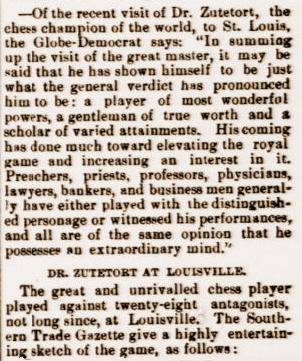
1885-86:
Steinitz defeated Zukertort +10 –5 =5 in New York, Saint Louis and New Orleans. In January 1885 Steinitz had begun publication of his International Chess Magazine, which contained much documentary material about the protracted match negotiations. At first the references were merely to the ‘championship’ or ‘the champion title’, without ‘world’. For example, on page 38 of the February 1885 issue Steinitz reported that in Turf, Field and Farm of 8 February 1884 [sic] he had published a challenge …
‘… to the effect that he was willing to play Mr Zukertort in New York, Philadelphia, New Orleans or Havana, or any other place this side of the Atlantic, for the champion title only, without any other stake or prize, and without charging any fee for expenses, while Mr Zukertort would be at liberty to make any terms he chose with any society which would arrange the contest. As the Globe-Democrat of St Louis subsequently remarked, Mr Steinitz offered to make the match a benefit performance, solely for Mr Zukertort’s pecuniary profit.’ [Italicized emphasis as in the original.]
On page 353 of the December 1885 issue of the International Chess Magazine Steinitz wrote:
‘The two players will soon enter on their heavy trial for the coveted championship of the world …’
The first sentence of the contract between the two players (the Chess Monthly, January 1886, pages 136-137) specified that the match was ‘for the Championship of the World’.
1887:
In C.N. 7119 Thomas Niessen (Aachen, Germany) drew attention to an article from the Illustrated Sporting and Dramatic News which was published on page 20 of the New Zealand Chess Chronicle, 25 October 1887. The first paragraph:
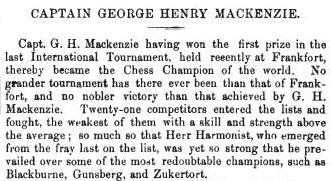
The writer was G.A. MacDonnell, and the article was included on pages 27-30 of his book The Knights and Kings of Chess (London, 1894):
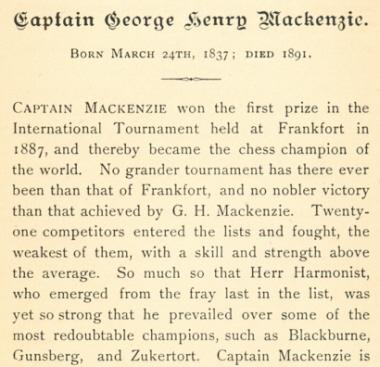
See also C.N. 3968. Steinitz had taken up the ‘chess champion of the world’ affair in the International Chess Magazine, starting on page 264 of the September 1887 issue, and there resulted a number of public exchanges with Mackenzie. Below are Steinitz’s comments on page 265:
‘Of course, such literary trickeries are nothing new to me, and I have been used to it for 20 years that according to the constructions in certain journalistic quarters everybody in turn was the champion during that period, excepting myself. The only consolation I had was that most of the defeats I suffered occurred in my own absence.’
1888:
On page 86 of the International Chess Magazine, April 1888 Steinitz asserted ‘for once’ that he had been world chess champion since 1866:
‘And I mean to devote to the task [i.e. exposing the alleged dishonesty of James Séguin], if necessary, the space of this column for the next 12 months, or for as many years, in case of further literary highway robberies perpetrated by the same individual, and provided that I and this journal survive, in order to statuate for all times, or as long as chess shall live, an example that the only true champion of the world for the last 22 years (I may say so for once), who has always defended his chess prestige against all-comers, has also a true regard for true public opinion, and that he can defy single-handed all the lying manufactories of press combinations to show any real stain on his honor; and that he can convict and severely punish any foul-mouthed editor who, like the shystering journalistic advocate of New Orleans, attempts to rob him of his good name outside of the chess board.’
From page 176 of the July 1888 International Chess Magazine:
‘Difficult as the task was, for I have had sometimes as many as half-a-dozen such editorial lunatics under treatment simultaneously, I have undertaken it empowered by my conscience and the right of natural selection, or, as Carlyle calls it, “the divine right of the strongest”, which, either by merit or accident, as you like to judge, has chosen me as the only true champion of the world for the last 22 years.’
C.N. 1780 quoted from the closing paragraph of the BCM’s obituary of Steinitz (September 1900, page 370):
‘As an analyst, the service which Mr Steinitz rendered to chess has never been equalled. He had a ready pen and incisive style – though he too often dipped that pen in gall. His work in the Modern Chess Instructor and his analysis of games in the International Chess Magazine was of a high order, but his base, scurrilous and filthy abuse of Mr James Séguin, the honourable and gentlemanly chess editor of the New Orleans Times Democrat, caused many issues of the magazine to be more suitable for consumption in the furnace than for preservation in the library of the chessplayer.’
Would a reader be prepared to go more deeply into this aspect of Steinitz’s writing, with regard to either Séguin or, perhaps, Hoffer? The main purpose would be to reach a clearer idea of the validity or otherwise of Steinitz’s reasoning and thus gain a better understanding of his character. To start with a brutally frank question: was James Séguin ‘honourable and gentlemanly’?
1890:
In a letter dated 3 April 1890 to a publishing company, Geo. Routledge & Sons, Steinitz wrote:
‘… in 1866 I won the Match championship of the world by beating the late Prof. Anderssen and I have held it ever since though Zukertort, Blackburne and Martínez contested it twice each in Matches as well as various other players including Chigorin, Mackenzie etc. in a match or series of games.’
Source: Page 115 of The Steinitz Papers by K. Landsberger (Jefferson, 2002).
This passage was quoted on page 169 of A Chess Omnibus, with a footnote referring to page 155 of The Steinitz Papers.
1891:
A ‘Testimonial to Mr William Steinitz (New York, April 1891)’ was published on pages 78-79 of the March 1891 International Chess Magazine. It began:
‘In a few months our greatest living chess master, the unconquered hero of many chess battles, one who has devoted his best talents and energies to the discovery and development of the many beautiful phases of our wonderful game, Mr William Steinitz, will attain the 25th anniversary of his acquirement of the championship of the world in his match with Anderssen, which he has held ever since – a record which is unparalleled in the history of chess.’
The testimonial announcement was also reproduced on page 297 of the June 1891 Chess Monthly.
Page 231 of the August 1891 International Chess Magazine reproduced the subscription list resulting from the testimonial. Steinitz wrote:
‘Mr Emmet Hamilton, of St Paul, Minn., has placed himself on record as the champion of individual generosity among chessplayers. He is the only one of our time. May there be many like him when another chess master of the future will celebrate his jubilee of the chess championship for 25 years.’
On page 265 of the September 1891 International Chess Magazine Steinitz wrote:
‘By the time that this is going to press I shall be on my way to Havana and the chess championship of the world will soon be placed on a trial which, under all the circumstances, will probably be the most severe one which the title has encountered since it was assigned to me over 25 years ago.’
1894:
Steinitz’s career was summarized on page 163 of the April 1894 BCM:
‘Wm. Steinitz, who is in his 58th year (he was born 17 May 1836), has held the chess championship of the world for 28 years, having won it by his defeat of Anderssen in 1866. During these 28 years his career has been one of continuous triumph …’
1899:
‘In 1865 I won the chief prize in Dublin, and it was then that a match was arranged for the championship of the world with Anderssen. One of the committee who arranged that match was the present Lord Chief Justice of England. I won it by 8 to 6, and became champion chess player of the world.’
W. Steinitz in a feature entitled ‘A Chat with Steinitz’ in the Jewish Chronicle, 4 August 1899, pages 12-13. See C.N. 5893.
Page 123 of the American Chess Magazine, September 1899, quoted a remark by Steinitz in the Glasgow Weekly Herald (quoted by us in Kingpin in 1995):
‘No great player blundered oftener than I have done. I was champion of the world for 28 years because I was 20 ahead of my time. I played on certain principles, which neither Zukertort nor anyone else of his time understood. The players of today, such as Lasker, Tarrasch, Pillsbury, Schlechter and others have adopted my principles, and as is only natural they have improved upon what I began, and that is the whole secret of the matter.’
1900:
The clearest statement we have seen from Steinitz himself was quoted in his 14 August 1900 obituary in the New York Times, from a pamphlet entitled My advertisement to anti-Semites in Vienna and Elsewhere:
‘And since 1895 I have been obliged at an advanced age and while I was half crippled to export myself in order to import only a portion of my living for myself and family, and this portion did not amount to $250 per annum within the last two years when I deduct traveling expenses and increased cost for staying abroad, although I was chess champion of the world for 28 years!!!’
1908:
Emanuel Lasker’s view appeared in an autobiographical article in Lasker’s Chess Magazine, May 1908, page 1:
‘The last tournament held there [in England] was in 1899. The continent has had more than a dozen meanwhile. England has not been the playing ground of a match for the championship of the world since Steinitz beat Anderssen, in 1866.’
The inescapable implication of Lasker’s references to England and to 1866 is that he considered a) that Steinitz’s matches against Zukertort (1872) and Blackburne (1876), both of which took place in London, were not for the world title and b) that, consequently, Steinitz held the world title for 20 years (1866-1886) without defending it at all. It is hard to imagine, though, that this was the meaning that Lasker intended to convey.
See too the full text of C.N. 3325 in World Chess Championship Rules.
A few eccentricities from The Knights and Kings of Chess by G.A. MacDonnell (London, 1894):
C.N.s 4369 and 5095 drew attention to a passage (conveying the same concept, but without the word ‘champion’) on page 116 of The History of Chess by Richard Lambe (London, 1764):
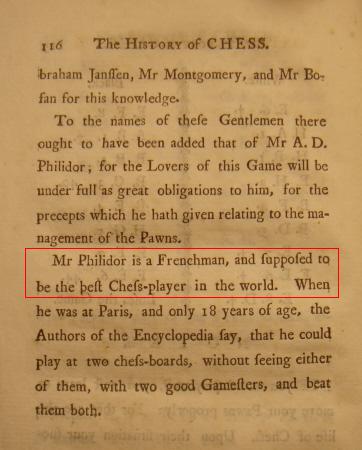
‘It is ridiculous to consider Steinitz as the First Unofficial World Champion because he defeated Anderssen in 1866. Morphy defeated Anderssen in 1858 and much more decisively than Steinitz beat any of his world chess players, including Anderssen, and when Anderssen was seven or eight years younger. Staunton has a far greater claim to being the First Unofficial World Chess Champion than Steinitz, for he defeated St Amant in 1843 far more decisively than Steinitz did in any of his unofficial world chess matches, and they were all unofficial, before FIDE, being simply personal claims.’
It tends to be forgotten that in 1866 there was some criticism of Steinitz’s wish to play a match against Anderssen. For example, the following appeared on page 379 of the February 1866 issue of the Chess World:
‘… the error committed by Mr Steinitz in consenting to this match is as nothing compared to that which he is rumoured to have in contemplation, to wit, the challenging of Mr Anderssen to a contest, upon even terms, for £100 a side! We suspect, however, and hope that this absurd report will prove to be an idle hoax.’
‘This match’ was a reference to Steinitz’s encounter with De Vere, in which he gave the odds of pawn and move. De Vere won with a score of +7 –3 =2.
(2508)
C.N. 1496 quoted without comment this passage from page 2 of Morphy Chess Masterpieces by F. Reinfeld and A. Soltis:
‘Paul Morphy was a Herculean figure in his day, and his fame has not suffered with time. He was not just the first American to triumph over representatives of the Old World at chess. He was the first American to achieve a position of world superiority in any field.’
We now note the following text from page 142 of Checkmate, May 1904:
‘In a recent letter to a New York journal Mr F.M. Teed called attention to the fact that America won the yachting and chess primacy of the world about half a century ago. The old cup, he says, is still here, and even those who don’t care for yachting (or, like him, can’t afford it) are always pleased to hear of another win for Columbia or Reliance.’
(3062)
An extract from C.N. 3464:
From pages 61-62 of volume one of The Life and Writings of Henry Thomas Buckle by A.H. Huth (London, 1880):
‘And certainly Buckle was in 1851 entitled to the championship not only of all England but of the whole world. Such a case has probably never occurred before of an amateur who was so thoroughly an amateur as only to play for his amusement, and devote no time to the mere study of the game, obtaining so great a victory.’
On page 333 of the July 1891 BCM Charles Tomlinson cited this 1851 championship claim as one of the ‘outrageous statements’ by Huth, ‘the too partial and too sanguine biographer’.
Bartlomiej Macieja (Lasek, Poland) refers to the feature articles Early Uses of ‘World Chess Champion’and World Chess Championship Rules and draws attention to a further text, published a few days before the first Steinitz v Lasker match began. Page 24 of the New York Times, 11 March 1894 stated:
‘For 26 years the veteran has successfully defended the championship of the world.’
Also:
‘If a man who has held the world’s championship for 26 years accepts a challenge for a match which promises to him less remuneration than matches he contested before, he deserves some praise.’
The illustrated article was also published, with due credit, on page 3 of the Montreal Daily Witness, 13 March 1894.
Nineteenth-century references to the duration of Steinitz’s tenure are always welcome, regardless of the view adopted.
(12082)
Latest update: 26 May 2025.
To the Chess Notes main page.
To the Archives for other feature articles.
Copyright: Edward Winter. All rights reserved.